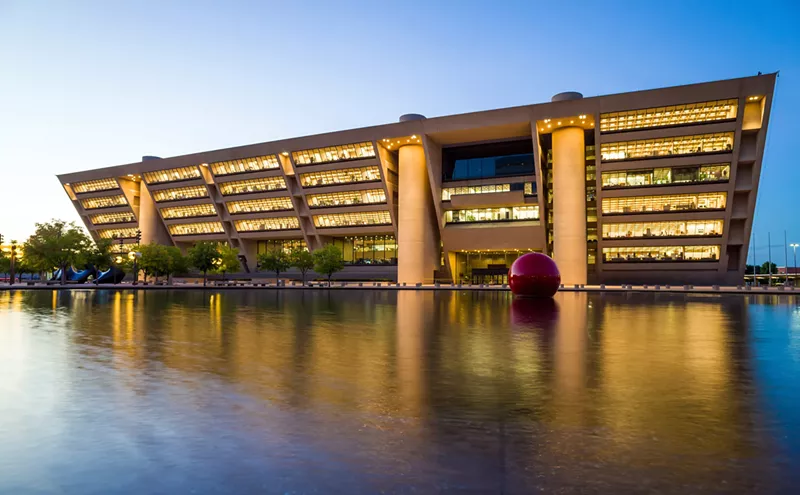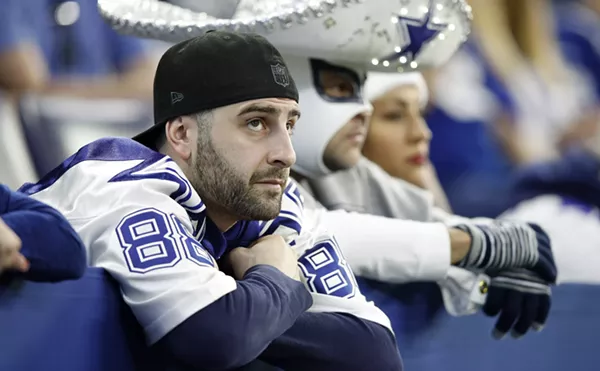"I started thinking about things like this in the sixth grade," the son says. "I had a teacher back then who really inspired me. She taught me how to respect the environment."
Most kids, stirred by elementary school recycling dogma, might, if they're lucky, persuade Mom and Dad to separate a few cans and bottles into collection bins.
Andrew got a lot more than that.
Sam Wyly, who sold two software companies in February for some $4 billion, plunked down $2.5 million last month to broadcast television ads in primary states that touted Texas Gov. George Bush's environmental record. The commercials, which began airing just a few days before the Super Tuesday presidential primaries, attacked Sen. John McCain for voting against solar energy and praised Bush for signing legislation to curb electric power plant pollution.
Initially aired without any information about who had paid for them other than identifying the Wylys' newly formed organization, Republicans for Clean Air, the commercials quickly raised questions about the Dallas billionaire's motives.
McCain led the skeptics. He identified Wyly as a Bush buddy who dropped millions to sway voters. "This is a textbook study," McCain said. "This whole thing is the most perfect example of why I have been so zealous in my pursuit of campaign finance reform."
But now that the brouhaha has died down and McCain has stepped out of the race, the story of how the advertising strategy unfolded makes it seem entirely plausible that Sam Wyly launched his controversial television pitch because of shared concerns with his son. Specifically, the ads put the Wylys and the family's newest business -- GreenMountain.Com, an energy marketing company that sells electricity from sources like solar power and wind energy -- on media center stage.
That's not a bad place to be if you are thinking about building market share and taking a company public. Last year, Wyly -- whose family, hedge fund, and others have invested $100 million in GreenMountain.Com -- planned to make an initial public stock offering that put the value of the company at $3 billion. He later decided against going public, and GreenMountain.Com lost $19.8 million in the first quarter of 1999, but clearly the company is still on Wyly's mind. Earlier this year at an energy conference in Aspen, Colorado, Wyly outlined his strategy for GreenMountain.Com. "As each state and nation deregulates it electric industry," Wyly said, "we plan to enter with our information campaign and help create a vibrant competitive market...Ultimately the majority of our customers will find us and be served over the World Wide Web."
The elder Wyly couldn't be reached for comment, but his son admits there was some talk about whether the pro-Bush ads could also drum up interest in the family business.
Jeb Hensarling, a consultant who worked with Wyly and managed Texas Sen. Phil Gramm's 1996 failed presidential bid, was Wyly's point man on the ads, though he initially counseled against them. But Wyly said he wanted "to recognize Governor Bush for what he did." (Hensarling agreed to speak to the Dallas Observer after Wyly himself publicly discussed how the ads came about.)
In truth, Wyly was recognizing Bush for what he didn't do -- namely, veto legislation introduced by Democratic state Rep. Steve Wolens that called for 68 of 760 electric plants in Texas to meet mandatory clean-air standards. At the time of the legislation's development, neither Wyly nor Bush was instrumental in its passage. "Wyly never came to the committee to testify," Wolens recalls, even though the legislator invited him. "I thought it would have been helpful."
But since the legislation had passed and Bush had not vetoed it, Wyly was ready to give the governor credit.
There was not much else positive in Bush's environmental record. Dallas-based political consultant Rob Allyn, who was paid $46,000 for helping create the ads, and Hensarling concede that they questioned the wisdom of attacking McCain's environmental record.
Hensarling was against the idea altogether, and he certainly didn't want to go negative. "I advised Sam that in my opinion, I didn't think his message would get out. Period," he says. "I thought a positive Bush ad would do a better job."
Allyn says he anticipated a backlash, especially since the Sierra Club had already been running ads, featuring a boy in an oxygen mask, that bashed the governor's environmental record.
Indeed, a few days after the Wyly commercials began airing, columnist Molly Ivins responded to the ad praising Bush's environmental records with the phrase, "Excuse me, I think I have a banana in my ear."
Ivins and others pointed out that Texas ranks No. 1 in toxic releases according to the Environmental Protection Agency. Bush's appointments to the state regulatory agency on the environment, the Texas Natural Resource Conservation Commission (TNRCC), have been mostly business types. Under the guidance of the oil industry, the governor encouraged the TNRCC to modify regulations that would force some 850 plants that polluted heavily to meet mandatory pollution standards. Bush, as the industry wanted, eventually signed legislation that structured a voluntary compliance program.
But on a Saturday afternoon in late February, while the Wylys and their advisors Allyn and Hensarling were encamped in a television-recording studio, the Dallas billionaire and his son didn't seem concerned about the criticism the ad would spark. Indeed, Allyn says, they seemed to welcome it.
At that point -- one week before the ads would start airing -- there were two proposed versions of the commercials. One mentioned only Bush's record in a positive light. Allyn had worked much of the previous night scripting it. The other proposed ad hammered McCain for his vote against funding for solar energy.
It was Andrew who performed a late-night search on the Internet and discovered McCain had cast that fateful vote. "It was a good contrast," Andrew says. "You have a senator who voted one way and a governor who acted another."
For Allyn and Hensarling, the proposed negative focus on McCain seemed fraught with risks. "We started building the positive ads," recalls Allyn. But, he says, "The Wylys were very determined...They wanted a contrast ad." Allyn recalls the 65-year-old Wyly saying something to the effect that "if you can't make them see the light, then make them feel the heat."
For now, the Wylys don't plan to re-enter the presidential race with any more issue advertising, Hensarling says. But they are considering their options for congressional races, possibly with commercials that help Republican candidates with good records on the environment. Andrew says he and his dad are thinking of ways to build up a membership and financial base for the newly formed Republicans for Clean Air. "We haven't taken any serious action yet," he says.
Allyn believes that the ads, despite his fretting to the contrary, possibly helped Bush. For certain, Allyn knows the ads bought the Wylys and GreenMountain.Com tremendous attention. For the first time, the company was profiled in The New York Times.
"This succeeded beyond their wildest dreams," he says.












